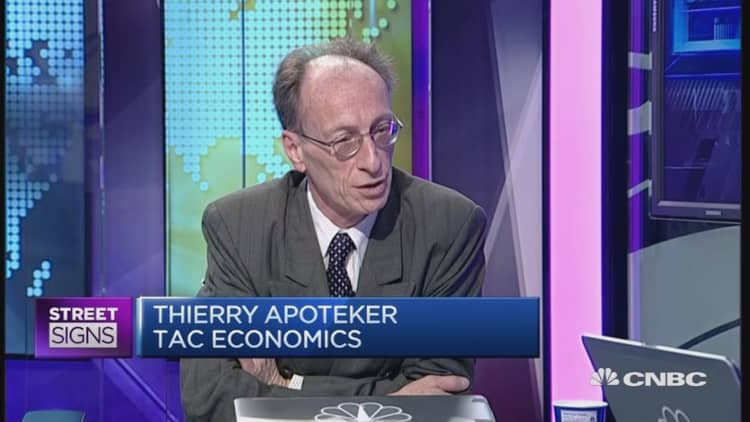
If you work on Wall Street, grab a chair. You might want to take this news sitting down.
Americans still hold big banks in low regard, years removed from the financial crisis. A SurveyMonkey poll of more than 10,000 U.S. adults calls Wall Street ruthless, and when people were asked which of the biggest U.S. companies named in the Fortune 100 were worst for the country, three of the top five names that came to mind were banks.
Survey respondents assigned "most ruthless" status to four banks — Goldman Sachs, JPMorgan Chase, Bank of America and Morgan Stanley. Goldman did not respond to a request for comment, the others declined comment.
The results on banks were a stark contrast to how respondents felt about technology companies: the top four companies they identified for having the most positive global impact are all in tech. No Wall Street firm made the list of places Americans would like to work the most. But tech companies dominated that category, taking up four of 10 spots.
The contrast between Silicon Valley and Wall Street is stark, and the survey acts as a reminder of the damage to the finance industry's prestige that accompanied turmoil brought in the global financial crisis.
Records from Gallup indicate that as far back as the late 1970s, 60 percent of Americans expressed confidence in the banking industry, with the level as high as 53 percent in years leading up to the crisis that began to boil over in 2007. That number plummeted after the market crash, to as low as 21 percent, but rebounded to 28 percent in the 2015 survey. A February 2016 poll, from the Harris Group, said 37 percent of Americans think the entire financial services industry has a "good reputation," from a crisis low of 11 percent.
"As much as banks continue to be reputation-challenged, we've seen some improvement since the Great Recession," said Stephen Hahn-Griffiths of the Reputation Institute, which tracks public sentiment.
While public opinion of Wall Street is recovering, hiring has not matched precrisis figures in terms of jobs or pay. The industry still hasn't matched its precrisis employment total, according to the state of New York. This year, big banks have had to cut their way to profitability while trying to build their technology teams — something that has challenged traditional financial services firms that have to fight off start-ups for top engineering talent.
"The competition for talent between Wall Street and tech firms is intensifying," said Michael Karp, founder of Options Group, a Wall Street recruiter. "The dynamics of recruitment have changed."
Tech sector hiring, notably in California, has been on the rebound since the financial crisis, according to trade group CompTIA, and nationwide the industry's job growth rate is at a 10-year high.

It's difficult to maintain pace with an industry that enjoys the benefit of public opinion, and it's even harder to do it when the paychecks aren't what they used to be. Since 2007, the average pay is down 55 percent for a mortgage backed securities trader, and the average mergers and acquisitions banker's pay is down 53 percent, according to the Options Group. More broadly, data tracked by New York state shows bonuses are down across the industry in the years after the financial crisis, and have not fully rebounded.
Some think the fall in pay has a lot to do with millennials' eagerness to work for tech companies and found start-ups where private stock options have virtually unlimited upside, more than public opinion.
"I think it is industry-related also and not employer-related; Dodd-Frank has stifled creativity and massively lowered morale," said David McCormack, CEO of recruitment firm DMC Partners. "Mediocrity has been blown out on Wall Street. Everyone is being held accountable and as headcount has reduced significantly, you now need to be stellar to survive and succeed."


